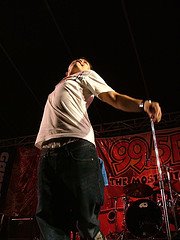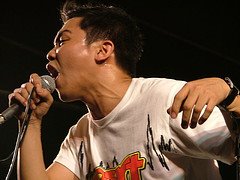One of my favorite writer.
I loved his "Rolling the R's."
Somewhere in my PC, I attempted to write a paper which I ambitiously entitled, "Attempting to Abrogate Cultural Hegemony in R. Zamora Linmarck's Rolling the R's."
Of course, that paper is yet to be written, and the stacks of references and research materials that I gathered are now probably rotting away in this continuum that I call as my 'old room.'
Flashback, senior year, 1st semester, My all time favorite professor, the uber-chichi Oscar Campomanes invited us to attend the 11th USTingan at UST-CCW (that's UST Center for Creative Writing).
Zack gave this wonderful, wonderful speech about being a Literature major and lo and behold, somewhere in this site, Nat actually posted the entire speech.
And, I, who have always been dancing around the edges of disillusionment can't help but sigh.
I wish I'm back at school. I miss school. Honestly.
- - -
Random Notes
By Ringhardt Zamora Lindmark
(delivered during the 11th USTingan in UST-CCWS)
It is 1980-something. You are a college student trapped in the middle of the Pacific. A closeted eccentric, a New Wave rebel, you walk around campus in London Fog raincoat bought at a thrift store owned and run by Presbyterians, your upper lip curling into a Billy Idol snarl, your identity sneering at the useless world behind a pair of Ray Ban shades. The blue skies and cool breeze of Honolulu, where winter is defined as below sixty-five, repel you. As it should. Otherwise, you are not an English major with a minor in Poetry writing. Otherwise you won’t be telling the Social Services Department four years later, when you apply for welfare and food stamps, that your special skills include time-travellig, voyeurism, and collecting words. Otherwise, you’ll be just another case-study freak profiled in a Psychology 100 textbook, or indexed in a Cultural Anthropology book written by a white man whose National-Geographic-claim-to-fame is that he’d spent a few months in the Philippine rain forest in the late seventies with Manda Elizalde studying Mada’s jungle bastards, the hoax-or-not Tasadays. Otherwise you’ll just be another Kerouac wanna-be hanging out in the jazz section of Tower Records, reciting from memory your grocery list and passing it off as poetry.
You are a student of Literature, Your darkness-driven heart reeks of poetry. The world does not understand your kind, your penchant for isolation, the color black, the mood swings. You understand Emily’s antics in the attic. The lyrics to Whitman’s songs come to you as you navigate yourself in the labyrinth of a bathhouse. In the morning, you fantasize waking up transformed into a Kafka bug. At night, in between the sentences of your dreams, you roast in Rimbaud’s inferno. And the butterflies of Garcia Lorca appear each time you swallow olive seeds.
You are a student of literature and that’s that: a fatalist in the making.
Besides, you know zilch about the outside world. Mathematics produces Nobel-prize winning neurotics. But you’re not, and never will be, one of them. True, you’ve been misdiagnosed a schizophrenic twice; you were actually manic-depressive with recurring hallucinations of your levitating in the backyard, amongst blooming flowers and monsoon-soaked sheets on the clothesline.
But those were during those two trying hard years when Sylvia Plath invaded your kitchen to bake herself at 500-degree Fahrenheit. As for the Sciences, they belong in Mars. At one point, you entertained the thought of going into Philisophy, talking shop with Nietzche. Godot never showed up. Had you stuck it out, Foucault could’ve explained to you the inextricable relationship between your power and knowledge and your fixation with nineteenth-century prison life.
Your identity, whether you like it or not, revolved around literature—the reading and writing of it. End of story. Or, rather, “the start of the end of your life,” as your parents often told you when you confessed your major to them. They’re right. Literature, whether teaching or writing it, pays jack sh!t; for most poets, the reward is two complementary copies of the journal in which the poem and their epitaph appear.
But you’re Filipino, steadfast, stoic, often willing to bend, yet remain unbreakable. Your history began, and will probably end, in the womb of a bamboo. A tempestuous future, you stick it out, determined to relive “A Hunger Artist” by Kafka; the artist in a cage, aping the gorilla. “Why, Anak? Why major in interpreting books?” And you tell you mother flat-out it’s because books teach you how to get away with murder. Through books, you’re discovering you are the most quixotic of God’s creatures and therefore have every right to christen yourself a knight, disturb the peace, and create fantastical adventures as you search for a dyke on a bike named Dulcinea.
That’s not all. You majored in Literature because your only talent in this world, aside from breaking lines, is interpreting and quoting passages with the patience of a recovered drug addict turned Born-Again Christian.
You are a bookworm. Feasting on other people’s words.
Paragraph by paragraph.
A maggot. Gnawing at other people’s imagination.
If there is anyone to blame for the bags under your eyes and split personality, aim the gun’s barrel at the Asian-American writer who visited your campus a few months back. Who inspired you to write after she told you she killed memories for a living.
In your third year as a Lit major, you enroll in a class called “Multicultural Literature”. It is a cross-disciplines course opened to English and American Studies majors. Offered for the first time in the university. You sign up because you like the sound of “multi culti lit”. A sixties craze, an academic phenomenon, in college campuses across the country. That was two decades ago, which is the length of time it takes for fashion and other craze to hit the islands. But no on is complaining. House on Mango Street by Sandra Cisneros is on the reading list. Which gives you a head strat because you used to live on a street like Mango Street. Ghetto of lively characters courting death and love at two in the afternoon.
Very quickly, you discover that multicultural literature is the literature of the non-whites, about non-whites, by non-whites. No Melville, no Hawthorne, no Updike. White writers are excluded. This does not surprise. You’re from Hawaii. And from your encounters with the white folks in Hawaii, you can honestly say they’re culturally chanllenged, deprived, bland as a Yorkshire pie. Their ancestors settled in Hawaii to exploit the land and its natural and human resources. Their culture is capital-based. This is why they are, to use a Hawaiian word, “Haoles”—without breath, without soul. They lack what Garcia Lorca calls duende, the bluest flam from within. They can’t jump, they can’t dance. And those that do dance don’t move their arms and panic whenever the beat changes.
Despite centuries of world dominance, of converting pagans and savages into law-abiding Christians, of gutting cultures and replacing it with theirs, the white race is finally starting to realize that no matter how many missionaries are sent to proseltize, no matter how many teachers force their students to standardize English, no matter how many bullets it take to domesticate the untamed, one true thing remains: colonialism results in a multitude of parodies, complexes, contradictions. The minstrel, Banana Man, the snake eating its tail.
Multicultural literature is the literature of the oppressed, colonized, marginalized. The books on the syllabi support your theory. The author bios on the book jackets tell you they are either hyphenated American or have made the United States their home. Jessica Hagedorn (Dogeaters) is Filipina-American; Maxine Hong Kingston (the Woman Warrior) id Chinese-American; Toni Morrison (Beloved) is African-American, and Bharati Mukherjee, a South Asian from Canada, is currently residing in California. Ironically, the novelists, the professor, a white female transplant from the East Coast, were all women; the poets, men (Garret Hong, Amiri Baraka, Li Young Lee, etc.)
For once, you can relate to the stories and poems. You develop an affinity with the writers and their works. You yourself are a person of color, a colonial bastard. To be specific—a strayed mongrel scavenging for home. You were born in the Philippines and grew up and educated in Hawaii. Philippines or Hawaii, you were born destined to be a child of the tropics where the year is divided between rain and sun. Both islands, as your grade school teachers did not inform you, have a particular shared history of colonial oppression and re-education. It isn’t until you take up an Honors cross-discipline class called “Culture and Colonialism” that you learn Hawaii and the Philippines have stron parallel history, parales pains and wounds. With one major difference: Hawaii made it to statehood, a last-minute addition triggered by the bombing of Pearl Harbor; the Philippines, heavily damaged by the war, were granted their independence.
Why? A white student asks during discussion of Dogeaters. He admitted he could not get past the first chapter of Haedorn’s novel, a critique of coños and squatters during the Marcos years, because the Taglish threw him off.
Why Hawaii and not the Philippines? At the tip of my tongue lies the possible answer: because who wants to rule an archipelago of damaged brown people and screwed-up coños?
Hagedorn’s words hit home, perhaps too close to home. Your anger fueled by her imagination, her sad and dangerous arias of loss and longing. For once, you can relate to text. For once the text is a mirror, allowing you a closer, if not better, glimse of yourself, and the home that awaits you.
Such affinities, such revelation, such disturbance afflict you throughout the semester. You begin to develop your own discourse on multicultural literature, specifically in the United States, its majot components, its popular characteristics. You re-hash your definition.
Multicultural literature is the literature about non-whites by non-whites. A 20th century feat—five centuries late but better late than never. Here, the darkies that, for hundreds of years, were relegated to shadows and echoes, are heard. They possess multiple points of view.
The shadows have form.
The shadows, too, are storytellers and poets.
Multicultural literature deals with race and gender identity formation, race and gender relations. IT deals with dispossession, disorientation, displacement, particularly, but not limited to, migrant narratives. IT deals with the construct of home, as a broken nation, as memory salvaged through imagination. It deals with the English language—how it is borrowed, butchered, redeemed. English as an oral, second, sign language.
At the end of the semester, the novels have performed their function. They’ve opened a can of worms and made you a better thinker, more knowledgeable of yourself, your relations with others, your history, and your home, or the absence of. And leave you with questions about race and gender relations, home and homelessness, and questions about yourself you may never have answers to.






















